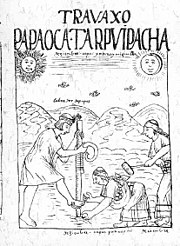
5th Century B.C.
In the ancient ruins of Peru and Chile, archaeologists have found potato remains that date back to 500 B.C. The Incas grew and ate them and also worshipped them. They even buried potatoes with their dead, they stashed potatoes in concealed bins for use in case of war or famine, they dried them, and carried them on long journeys to eat on the way (dried or soaked in stew). Ancient Inca potatoes had dark purplish skins and yellow flesh. The Incas called the potato "papas," as they do today. Following is the Inca prayer that historians say they used to worship them.
"O Creator! Thou who givest life to all things and hast made men that they may live, and multiply. Multiply also the fruits of the earth, the potatoes and other food that thou hast made, that men may not suffer from hunger and misery."
16th Century A.D.
The Spanish conquistadors first encountered the potato when they begin arrived in Peru in 1532 in search of gold.
1540 - Pedro de Cieza de Leon (1518–1560), Spanish Conquistador and historian, who wrote about the potato in his chronicles, Chronicles of Peru, in 1540:
"In the vicinities of Quito the inhabitants have with to the maize an other plant that serves to support in great part their existence: the potatoes, that they are of the roots similar to the tubercoli, supplies of one rind more or little hard; when they come bubbled they become to hold like the cooked chestnuts; seccate to the sun call to them chuno and they are conserved for the use."
1565 - Spanish explorer and conqueror, Gonzalo Jiminez de Quesada (1499-1579), took the potato to Spain in lieu of the gold he did not find. The Spanish though that they were a kind of truffle and called them "tartuffo." Potatoes were soon a standard supply item on the Spanish ships; they noticed that the sailors who ate papas (potatoes) did not suffer from scurvy.
1597 - John Gerard (1545-1612), an British author, avid gardener, and collector of rare plants, received roots of the plant from Virginia where he was able to successfully grow it in his own garden. He wrote in his book The herball, the following about the potato:
"Potatoes of the Virginia. The potato of the Virginia has many coppers flexible cables and that crawl for earth... The root is thick, large and tuberosa; not much various one for shape, color and sapore from common potatoes (the sweet potatoes) but a smaller Pò; some are round as spheres, other ovals; the some longer other shortest ones... It grows spontaneously in America where, as Clusius has reported, it has been discovered; from then I have received these roots from the Virginia otherwise Norembega calls; they grow and they prosper in my garden like in their country of origin... Its correct name is cited in the title it. Poichè it possesses not only the shape and the proportions of potatoes, but also their gradevole sapore and virtue we can call them potatoes of the America or Virginia."
NOTE: Although potatoes were called "potatoes of the Virginia" by early English botanists, they were in fact from South America, not the state of Virginia in the United States.